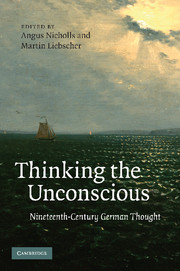Book contents
- Frontmatter
- Contents
- Notes on contributors
- Introduction: thinking the unconscious
- 1 The unconscious from the Storm and Stress to Weimar classicism: the dialectic of time and pleasure
- 2 The philosophical significance of Schelling's conception of the unconscious
- 3 The scientific unconscious: Goethe's post-Kantian epistemology
- 4 The hidden agent of the self: towards an aesthetic theory of the non-conscious in German romanticism
- 5 The real essence of human beings: Schopenhauer and the unconscious will
- 6 Carl Gustav Carus and the science of the unconscious
- 7 Eduard von Hartmann's Philosophy of the Unconscious
- 8 Gustav Theodor Fechner and the unconscious
- 9 Friedrich Nietzsche's perspectives on the unconscious
- 10 Freud and nineteenth-century philosophical sources on the unconscious
- Epilogue: the “optional” unconscious
- Works cited
- Index
- References
3 - The scientific unconscious: Goethe's post-Kantian epistemology
Published online by Cambridge University Press: 04 August 2010
- Frontmatter
- Contents
- Notes on contributors
- Introduction: thinking the unconscious
- 1 The unconscious from the Storm and Stress to Weimar classicism: the dialectic of time and pleasure
- 2 The philosophical significance of Schelling's conception of the unconscious
- 3 The scientific unconscious: Goethe's post-Kantian epistemology
- 4 The hidden agent of the self: towards an aesthetic theory of the non-conscious in German romanticism
- 5 The real essence of human beings: Schopenhauer and the unconscious will
- 6 Carl Gustav Carus and the science of the unconscious
- 7 Eduard von Hartmann's Philosophy of the Unconscious
- 8 Gustav Theodor Fechner and the unconscious
- 9 Friedrich Nietzsche's perspectives on the unconscious
- 10 Freud and nineteenth-century philosophical sources on the unconscious
- Epilogue: the “optional” unconscious
- Works cited
- Index
- References
Summary
Introduction: the unconscious in relation to the human and natural sciences
Perhaps the most important legacy of the various nineteenth-century German discourses on the unconscious is the cardinal status of this concept within what Freud understood to be the “science” of psychoanalysis. Despite the much-disputed scientific status of psychoanalysis, even as late as the second half of the twentieth century Michel Foucault saw the unconscious as an epistemological category which demarcates not only psychoanalysis or psychology, but also the field of the human sciences in general. “On the horizon of any human science,” writes Foucault,
there is the project of bringing man's consciousness back to its real conditions, of restoring it to the contents and forms that brought it into being, and elude us within it; this is why the problem of the unconscious – its possibility, status, mode of existence, the means of knowing it and of bringing it to light – is not simply a problem within the human sciences which they can be thought of as encountering by chance in their steps; it is a problem that is ultimately coextensive with their very existence.
Foucault argues that what separates the human from the natural sciences is that in the former, the category of “the human” necessarily becomes both the subject and the object of any possible knowledge. Thus, while Descartes had assumed that the logical cogito may have the capacity to know the non-human world of extended substance through purely rational deduction, this situation changed radically during the nineteenth century, when “the human” came, in newly professionalized fields such as psychology and sociology, to be an empirical object of scientific investigation.
- Type
- Chapter
- Information
- Thinking the UnconsciousNineteenth-Century German Thought, pp. 87 - 120Publisher: Cambridge University PressPrint publication year: 2010
References
- 4
- Cited by



